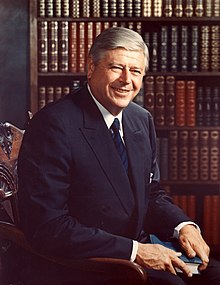
Back روجرز مورتون Arabic روجرز مورتون ARZ روجرز مورتون AZB Rogers Morton German Rogers Morton French רוג'רס מורטון HE Rogers Morton Polish Мортон, Роджерс Russian Rogers Morton SIMPLE Rogers Morton Swedish
Rogers Morton | |
|---|---|
 | |
| Counselor to the President | |
| In office February 2, 1976 – April 1, 1976 | |
| President | Gerald Ford |
| Preceded by | Robert T. Hartmann John Marsh |
| Succeeded by | Robert T. Hartmann John Marsh |
| 22nd United States Secretary of Commerce | |
| In office May 1, 1975 – February 2, 1976 | |
| President | Gerald Ford |
| Preceded by | Frederick B. Dent |
| Succeeded by | Elliot Richardson |
| 39th United States Secretary of the Interior | |
| In office January 29, 1971 – April 30, 1975 | |
| President | Richard Nixon Gerald Ford |
| Preceded by | Wally Hickel |
| Succeeded by | Stanley K. Hathaway |
| Chair of the Republican National Committee | |
| In office April 14, 1969 – January 15, 1971 | |
| Preceded by | Ray C. Bliss |
| Succeeded by | Bob Dole |
| Member of the U.S. House of Representatives from Maryland's 1st district | |
| In office January 3, 1963 – January 29, 1971 | |
| Preceded by | Thomas Johnson |
| Succeeded by | Bill Mills |
| Personal details | |
| Born | Rogers Clark Ballard Morton September 19, 1914 Louisville, Kentucky, U.S. |
| Died | April 19, 1979 (aged 64) Easton, Maryland, U.S. |
| Political party | Republican |
| Spouse | Anne Jones (m. 1939) |
| Children | 2 |
| Relatives | Thruston Ballard Morton (brother) |
| Education | Yale University (BS) Columbia University |
| Military service | |
| Allegiance | |
| Branch/service | |
| Battles/wars | World War II |
Rogers Clark Ballard Morton (September 19, 1914 – April 19, 1979) was an American politician who served as the U.S. Secretary of the Interior and Secretary of Commerce during the administrations of presidents Richard Nixon and Gerald Ford, respectively. He also served as a member of the U.S. House of Representatives from Maryland.
Morton was born in Louisville, Kentucky, and moved to a farm on the Eastern Shore of Maryland in the early 1950s. In 1962, he was elected to the House of Representatives, in which capacity he established a pro-environment record.[citation needed] Morton would joke that his two middle initials stood for "Chesapeake Bay".[when?] In 1968, Morton played a major role in Richard Nixon's campaign for president, and was chosen by Nixon in 1969 to serve as chairman of the Republican National Committee.
In the elections of 1970, Morton was considered a strong candidate to challenge Joseph Tydings for his U.S. Senate seat from Maryland, but he chose instead to remain as chairman of the RNC. In 1971, President Nixon tapped Morton to serve as Secretary of the Interior, during which time he oversaw the construction of the Trans-Alaska Pipeline System and the 1973 oil crisis. Morton was the only person from the East Coast to serve as head of the Interior Department in the 20th century.[citation needed]
Following Nixon's resignation due to the Watergate Scandal, Morton continued in his post in the Gerald Ford administration until 1975, when he was nominated to serve as Secretary of Commerce. From April to August 1976, Morton served as Ford's campaign manager in his bid for election. Morton retired from politics following Ford's election defeat. Three years later, he died of cancer at his home in Easton on the eastern shore of Maryland.